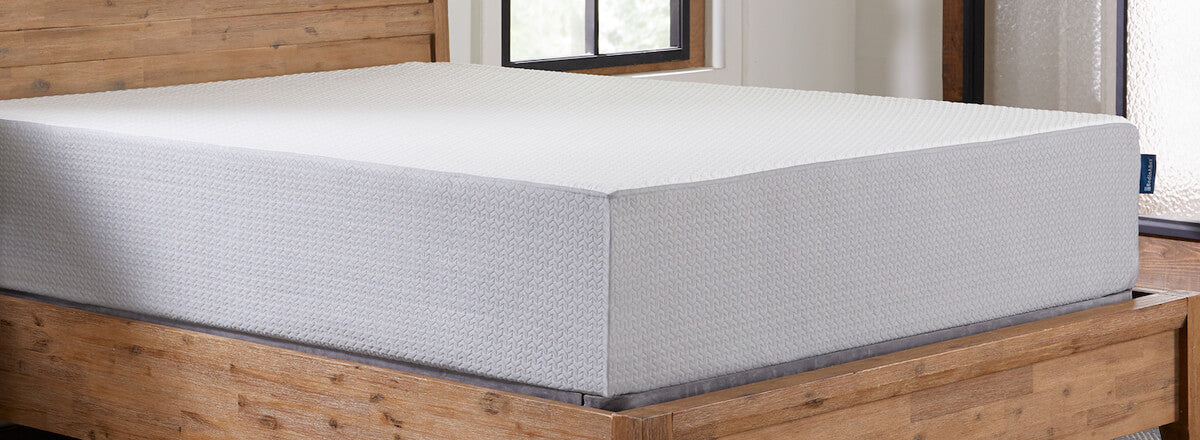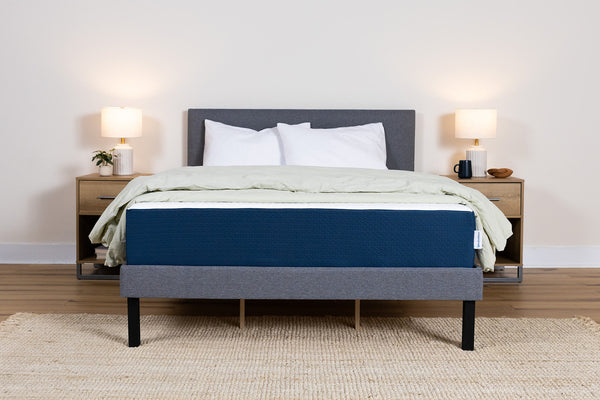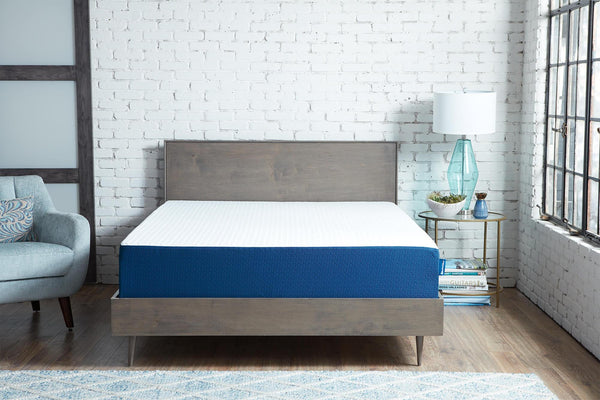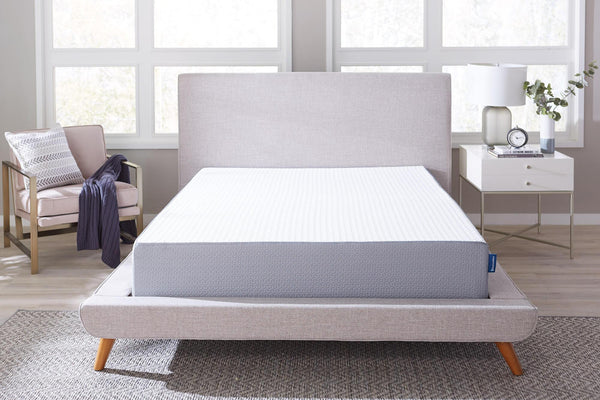Memory Foam vs. Inner Spring Mattresses

With so many different mattresses on the market, how do you choose which mattress is right for you? In this blog, we compare two of the most common mattress constructions: memory foam vs. innerspring mattresses. Keep reading to learn more about the differences and similarities between the two mattress types and which mattress best suits your sleep preferences.
Contents
What is a memory foam mattress?
Memory foam is a pliable foam that contours around the body to provide moldable support, or what we commonly refer to as a hugging sensation. Most memory foam mattresses are constructed with two or more layers of foam, the top layer always memory foam with the bottom most layer usually a dense support foam. The construction of your memory foam mattress determines how soft or firm it will feel.
The Science Behind Memory Foam
Memory foam is made of polyurethane foam. Well, what is polyurethane? Polyurethane is made up of polymers, which are big molecules (synthetic or natural) that are bonded together with urethane to create a chain. The polyurethane is mixed with other substances to create memory foams of varying densities, all of which having unique conforming properties that allow it to contour to our bodies. Memory foam is ultimately designed to achieve an even and equal body weight distribution when we sit or sleep on the material. BedInABox® mattresses are built with a number of different BedInABox® memory foams to provide every level of firmness and support.
CertiPUR-US® Certification: Safety First with BedInABox
All memory foams used in BedInABox® mattresses are CertiPUR-US® certified. This means that the foams used to make our memory foam mattresses have been tested for content, emissions and durability by accredited labs. By making our memory foams and mattresses in house, we are able to control everything from manufacturing to delivery to guarantee the highest quality product in every box.
What is a spring mattress?
Most commonly referred to as innerspring mattresses, the spring mattress is the most common and traditional mattress construction. The innerspring mattress can be constructed in several ways, but are most often made of three different layers. Inside, you will find steel springs or coils cushioned by a comfort layer on top and a foam support layer on the bottom. The springs themselves support the body from sinking into the mattress with the thickness of the springs or coils determining how firm your mattress will feel. Innerspring mattresses usually have more bounce than memory foam mattresses and don’t often conform to the body like foam does, which can help with heat regulation.
Different Types of Spring Mattresses
Pocket coils are individually wrapped coils covered in fabric. A mattress that has pocket coils is better for body contouring and motion isolation, especially if the coil count is high. The protective sleeve of fabric also stops the metal from poking through to the other layers of the mattress. Between the coils and the mattress cover can be several layers of padding, often made with cotton, wool, foam, polyester, or a combination of materials. Sometimes there is a transition layer between the padding and the springs for added support or comfort.
Open-spring coils come in a number of different varieties, all of which are “exposed.” They can either come as one unit, such as continuous coils, or are individual metal coils, such as offset or bonnet coils.
The Traditional Feel of Springs
As mentioned above, springs are great for extra support. The shape and thickness of the coil determine the amount of support and motion transfer a mattress provides, but the metal material reinforces the structural integrity. The telltale bounce of an innerspring mattress demonstrates its flexibility. Those who run hot or need firmer support generally benefit from an innerspring mattress. The breathability of the materials allows for more air circulation around the body as you sleep.
Comparing Comfort Levels
Temperature and Support
Memory foam is now known for its pressure-relieving qualities. The more you use it, the more it imprints on your body and sleeping patterns. Similar to clay, it becomes more malleable over time. Also like clay, it reacts to temperature fluctuations. When cold, the foam feels firmer; when warm, it becomes softer and has more elasticity. Its unique reaction to pressure and temperature is what makes memory foam stand out against other mattress constructions. More recently, many memory foams are designed with cooling technologies.
Innerspring mattresses are the longest standing mattress construction in the industry and are by far the most common worldwide. With coils providing a flat, durable landscape, the innerspring mattress guarantees support and breathability. It maintains its promise of getting a good night’s sleep, especially for those who may weigh slightly heavier and need firmer support.
Mattress Durability
Most sleep and mattress organizations generally suggest replacing your mattress every 5-10 years. Memory foam mattresses are generally more durable than innerspring mattresses though, lasting anywhere from 8 to 15 years. The durability of your mattress correlates to the density of the foam in your mattress. When you buy BedInABox®, you’re guaranteed longevity. Our mattresses are backed by a 20-year warranty because they are built with high quality, American-made foams that are built to last.
An innerspring mattress typically lasts 7 to 10 years, the springs often showing signs of wear after 5 to 7 years. You might prolong its lifespan if you rotate your mattress with frequency.
Understanding Motion Transfer
While a spring mattress tends to bounce with movement, a memory foam mattress absorbs movement. The polyurethane memory foam material slowly releases applied energy by evenly distributing pressure. Because memory foam cells are impacted independently of each other, motion is not spread quickly to other parts of the mattress. If you share a bed with a restless sleeper, a memory foam mattress eliminates the quick spread of movement so you don’t feel it.
An innerspring mattress is not designed to quell motion transfer. The bounce of the coils naturally sends a ripple of movement across the mattress. An open-spring mattress has the most motion transfer. To remedy this, mattress makers invented pocket coils to help isolate movement. Remember, motion isolation is a preference. If you have back pain or a partner that doesn’t mind motion transfer, an innerspring mattress could still be a good fit for you.
Maintenance and Upkeep
Caring for your BedInABox® memory foam mattress is surprisingly easy. To simplify upkeep, we suggest topping your mattress with one of our BedInABox® mattress protectors. In using a mattress protector, you are creating a breathable, washable barrier against dust mites, bacteria, and fluids that helps protect the integrity of your mattress materials, which generally prolongs the life of the mattress itself.
For more thorough cleaning, try gently vacuuming with a clean nozzle and spraying any problem spots with a gentle cleanser. For detailed information on cleaning and disinfecting your mattress, please visit our Mattress Cleaning Guide.
The support of an innerspring mattress may hold longer if you rotate it every 6 months. This can prolong any mattress sagging. Using a solid foundation or a box spring will minimize stress on a spring mattress.
Health and Safety Standards
The most common allergen affecting bedtime is the dust mite. Dust mites are microscopic arthropods that thrive in warm, humid environments. They find crevices to live in and feed on dead skin cells. Because memory foam is naturally dense, it does a better job at blocking dust mites and other microbes from invading your sleeping space, especially with regular cleaning. BedInABox® offers hypoallergenic sleep essentials including a weighted blanket and mattress protectors to maintain a clean sleep environment, as well. All BedInABox® mattresses also maintain the CertiPUR-US® and OEKO-TEX® STANDARD 100 certifications, ensuring their safety.
Innerspring mattresses are poorly suited against dust mites. The coils often collect dust and provide a warm, humid environment that attracts dust mites. This mattress type is more prone to dust mites than foam, latex, and gel mattresses.
Cost Considerations
While memory foam mattresses tend to come with a higher price tage, at BedInABox® we provide quality mattresses at a more affordable price. We handle your mattress from manufacturing to delivery, allowing us quality control at every step of the process. The classic Original BedInABox® mattress starts at only $749. Every mattress is delivered with a 120-night risk-free trial, too, so you can be sure that a BedInABox® mattress is right for you—no strings attached!
Innerspring mattresses do tend to cost less than memory foam mattresses, making them a budget friendly option.
Which mattress is right for you?
Memory Foam Mattress Features:
- Cradles comfort
- Pressure relief for neck, spine and hips
- Motion Isolation
- Can be constructed with cooling technologies
- Great support for all sleep positions
Innerspring
- Range of firmness
- High motion transfer
- More bounce, less pressure relief
- Budget friendly
- Great back support
At the end of the day, you know what is best for you. Every person has their own sleep preferences, making one mattress better for them than another. Still have questions about the difference between memory foam and innerspring mattresses? Contact us today to begin your journey towards better sleep.
Frequently Asked Questions
Which mattress provides better pressure relief, memory foam or innerspring?
Generally, memory foam mattresses provide superior pressure relief — it just takes memory foam a while to adapt to your body, and once it does, it will shift, disperse your weight, and relieve your pressure points around susceptible areas, mainly your hips and shoulders. Whereas the innerspring mattress has a more rigid feel and does not conform as much; if pressure relief is important to you, explore a memory foam mattress.
Does memory foam offer better motion isolation than innerspring mattresses?
Yes, memory foam significantly reduces motion transfer. Since it absorbs movement, you are less likely to feel your partner's movements during the night. Innerspring mattresses tend to bounce more abundantly which can mean more disruption. If you or your partner move around a lot, memory foam will help keep you at ease.
Which mattress type is quieter during sleep: memory foam or innerspring?
In contrast to innerspring mattresses, memory foam mattresses are considerably quieter. There are no metal coils — there are no creaks, no squeaks when you move. If you are sensitive to sound or enjoy a quiet sleep environment, memory foam is definitely the way to go.
Is memory foam more effective at contouring to your body than innerspring?
Yes. Memory foam provides a cushiony hug around your body and is excellent for conforming to the shape of your body to provide personalized support. Innerspring mattresses tend to be firmer, bouncier, and simply do not contour as much as a memory foam mattress. If you want your mattress to feel like it is personalized for you, memory foam is the better option.
Which mattress tends to last longer: memory foam or innerspring?
A memory foam mattress will typically last longer than an innerspring mattress. Quality memory foam mattresses tend to be able to stay comfortable and supportive for 8-15 years. Typically, innerspring mattresses will begin to show wear and tear after about 7-10 years. Also, BedInABox® memory foam mattresses come with a 20-year warranty, that gives you a decent life.
Is memory foam a better choice for couples than innerspring mattresses?
Memory foam is often the better option for couples. It isolates motion well, so you won't notice if your partner is tossing and turning. It also provides great pressure relief for both sleepers. Innerspring mattresses often move around a lot, which can lead to more nighttime disturbances.


